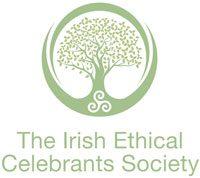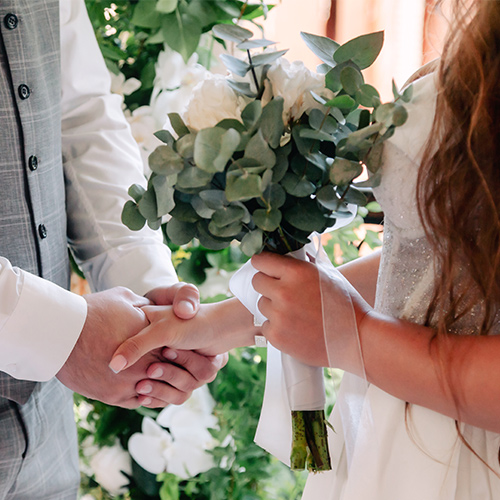Planning your wedding in beautiful Ireland? Congratulations!! This is an exciting time, full of dreams about your perfect day. As you imagine your ceremony, you’re likely to have come across two terms that can cause a bit of head-scratching: “celebrant” and “solemniser.” What’s the difference, and why does it matter for your big day?
Fear not! The Irish Ethical Celebrants Society (IECS) is here to clarify things, helping you understand these roles with clear, accurate information, based on legislation in the Republic of Ireland. So, let’s untangle this, focusing on what you need to know to make informed choices for your marriage ceremony.
At the IECS, we believe that every marriage deserves a ceremony that is deeply personal, inclusive, and professionally delivered. Our members are trained to the highest standards, focusing on crafting ceremonies that are respectful of all beliefs, cultures, and orientations. Crucially, our membership is made up of both Celebrants and registered Solemnisers. This means you can have the choice of the best of both worlds: a highly personalised ceremony that genuinely reflects you, and the peace of mind knowing that all the legal requirements for your marriage are being met, right there, in the moment, surrounded by your loved ones, a seamless celebration of your love story.
So, whether you’re looking for a simple, legally binding “I do” or a grand, sweeping declaration of love with all the bells and whistles, understanding the roles of celebrants and solemnisers in Ireland is your first step to making your special day truly yours. And remember, when you choose a member of the IECS, you’re choosing a professional who is committed to excellence, integrity, and making your milestone moment as unique and joyful as you are.
The Big Reveal: What’s the Difference, Really?
Alright, let’s get straight to the point. The fundamental difference between a Celebrant and a Solemniser in the Republic of Ireland boils down to one crucial thing: legal authority to solemnise a marriage. Think of it like this:
● The Celebrant: Architect of Your Personal Story: A celebrant, like those of us at the IECS, is a maestro of meaningful ceremonies, dedicated to crafting and delivering bespoke, personal, and utterly unforgettable moments for all of life’s milestones, including weddings. Our role is to truly get to know you as a couple, understanding your unique journey, values, and dreams. We then weave these elements into a ceremony that is authentically “you,” incorporating personal stories, meaningful readings, your favourite music, and symbolic rituals (like a handfasting or unity candle) that resonate with your love. We can design a ceremony that is as traditional or as modern, as serious or as humorous, as you desire. However, the ceremony we conduct for a marriage is not legally binding on its own. This means that while your celebrant-led ceremony will be the emotional heart of your wedding day, you will still need to complete the legal paperwork for your marriage separately. This typically involves attending a civil ceremony at a Civil Registration Service offi ce, often on a different day, to sign the offi cial Marriage Registration Form (MRF) as required by the Civil Registration Act 2004 and the Marriage Act 2015.
● The Solemniser: Guardian of the Legal “I Do”: A solemniser, like those here at the IECS, on the other hand, is an individual who holds the legal authority, granted by the State, to perform a legally binding marriage ceremony in the Republic of Ireland. They are offi cially listed on the Register of Solemnisers maintained by the General Register Offi ce (GRO). Their primary responsibility, when conducting a marriage, is to ensure all legal requirements are met, as stipulated by Irish law. In Ireland, solemnisers generally fall into these categories:
○ Secular Solemnisers: These individuals are nominated by recognised secular bodies and are authorised to conduct legally binding, non-religious ceremonies.
○ Civil Registrars: These are employees of the Health Service Executive (HSE) who conduct civil ceremonies, typically in a registry office. These ceremonies are secular, with no religious or spiritual content.
○ Religious Solemnisers: These individuals are authorised by their recognised religious bodies (such as priests, ministers, imams, etc.) to conduct marriages according to their faith’s traditions.
●The solemniser ensures that all parties understand the declarations required by law and that the Marriage Registration Form (MRF) is correctly signed, making your union legally recognised. They are essentially the gatekeepers of the legal “I do.”
● It is also good to note that what a Solemniser can offer varies greatly, some are bound by belief systems and rules where others have more freedom to include different elements to personalise your ceremony.
Why This Distinction Matters for Your Wedding Day
It’s not just about the paperwork, though that’s undeniably important! The distinction highlights the different, yet complementary, focuses:
● The solemniser’s legal role is about adhering strictly to the Civil Registration Act 2004 (particularly Section 51, which outlines the solemnisation of marriages) and the Marriage Act 2015. They ensure you’ve given your statutory three months’ notice to the Registrar, that you’re both over 18, and that there are no legal impediments to your marriage. Their focus is on legal compliance.
● The celebrant’s artistic role (whether or not they are also a solemniser) is about capturing the essence of your relationship. Their focus is squarely on you – your story, your values, your quirks, and your dreams. They spend time getting to know you, crafting a ceremony that reflects your unique bond, and making sure everyone present feels truly part of something special. They are the ones who’ll help you write vows that make your beloved (and maybe even a few guests!) shed a happy tear, or incorporate that ancient Irish handfasting ritual you’ve always dreamed of.
Celebrants vs. Solemnisers: At a Quick Glance for Your Irish Wedding
| Feature | Celebrant (without Solemniser Status) | Solemniser (Civil, Religious, or Secular) |
| Primary Role | Creates and officiates highly personalised, non-legal ceremonies for any life milestone (including weddings). | Conducts legally binding marriage ceremonies according to State law. |
| Legal Authority to Marry? | No (The ceremony itself is not legally binding for marriage in Ireland). | Yes (They are legally authorised to solemnise a marriage under Irish law). |
| Ceremony Style | Fully customisable, refl ects your unique story, beliefs, and values. No legal constraints on content or structure. | Varies by solemniser type. Civil ceremonies are secular and follow a prescribed format. Religious ceremonies follow their faith’s traditions. Secular solemnisers offer non-religious, legally compliant ceremonies. |
| Legal Paperwork | You must complete a separate civil ceremony (e.g., at a Registry Office) to legally register your marriage. | They oversee the signing of the Marriage Registration Form (MRF) as part of the legal ceremony. |
| Where they operate | Anywhere suitable and agreed upon with the couple. | At a place approved by the Registrar (e.g., Registry Offi ce, approved religious buildings, or other approved venues, provided they meet legal requirements). |
| Best for… | Couples who want an incredibly personal, unique ceremony but are happy to do the legal bit separately (usually before or after the celebrant ceremony). | Couples who primarily need the legal registration of their marriage, or wish to marry within a specifi c religious tradition, where the solemniser performs both the personal and legal aspects simultaneously. |
Useful Links for Your Wedding Journey:
● Citizens Information – Different types of marriage ceremony in Ireland: https://www.citizensinformation.ie/en/birth-family-relationships/getting-married/different-legal-ways-of-getting-married/
● HSE Civil Registration Service – Getting Married: https://www2.hse.ie/services/births-deaths-and-marriages/getting-married/
● Irish Statute Book – Civil Registration Act 2004: https://www.irishstatutebook.ie/eli/2004/act/3/enacted/en/html
● Irish Statute Book – Marriage Act 2015: https://www.oireachtas.ie/en/bills/bill/2015/78/ (This links to the Oireachtas page for the Act, where you can fi nd the full text.)
● Register of Solemnisers: You can find the most up-to-date Register of Solemnisers on the General Register Office (GRO) website, typically linked from the Citizens Information or HSE sites. A direct link is not stable as the register is updated regularly, but searching “Register of Solemnisers Ireland” will typically lead you to it.


